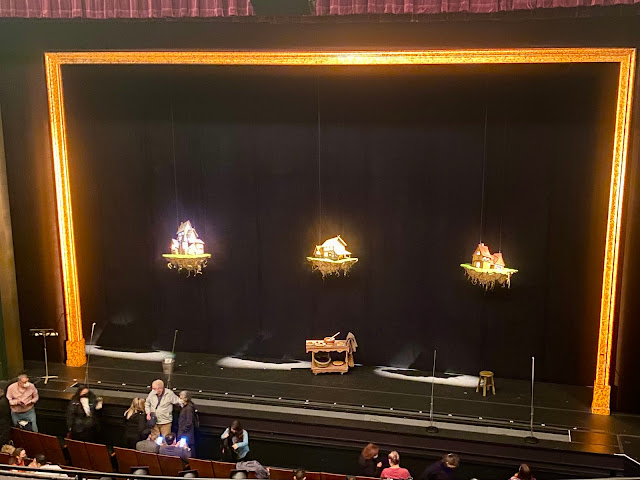The man even older than I in the row ahead at the Hudson Theater announced he had seen the original Merrily We Roll Along in 1982. He didn't fall asleep this time. Director Maria Friedman and perfect casting has slain the ghost of Hal Prince in the Tony-nominated production for Best Revival and brought Merrily back to heartbreaking life.
Merrily's flop pretty much ended one of Broadway's most creative partnerships but Stephen Sondheim acolytes have known from the beginning that the composer's extremely hummable score never was the problem, although it took me decades to realize it. Like everyone else I'd been blown away by the sheer audacity of Sweeney Todd, their previous show, but my familiarity with Merrily didn't begin until Barnet and I had a falling out in the 90s. We made up by each recording one side of a cassette tape with our favorite songs about friendship. Both included one called "Old Friends," his by Sondheim, mine by Paul Simon.
Then, a decade ago, I got a glimpse of the show's potential when Dan scored tickets to a one-night only filmed-live West End production, also directed by Ms. Friedman. It turned me on to "Our Time," surely the most beautiful song ever written about talented people coming of age:
We're what's happening
Don't you know, we're the movers and we're the shapers
We're the names in tomorrow's papers
Up to us man, to show 'em
It's our timeI don't remember much else about the production, except that I nodded off, perhaps because it lacked star power and the backwards-in-time story made it difficult to follow for a first-timer.
Now, thanks to doing my homework enhanced by relatively new technology, which included following the lyrics while listening to the original cast recording on my phone and reading the Wikipedia plot synopsis, I rank it among my favorite Sondheim shows ever, due in no small part to stars
Jonathan Groff and
Daniel Radcliffe, and a talented supporting cast that makes it easy to distinguish among the key secondary players who in the filmed version had coalesced like the "blob" of hangers on.
Lindsay Mendez, while also fine, has little to do other than deliver hugs or takedowns; her characterization is the most dated thing about the show.
Ultimately,
Merrily is less about friendship than the very different places time has taken Frank, Charlie and Mary. Friedman focuses on Frank, the talented composer and charming go-getter, who at the beginning has "gone Hollywood," compromising the values he may--or may not--have once shared with Charlie, an acerbic, left-wing Pulitzer Prize-winning novelist who shuns the limelight and Mary, a book critic whose love for Frank has curdled into alcoholism. I can't help but think Sondheim's own experience with Hollywood--he co-wrote the screenplay for
The Last of Sheila, a well-reviewed whodunit with an all-star cast that didn't make much money--probably informed both his distaste for the scene and how seductive it could be. Instead, he took Charlie's route by returning to New York and composing the brilliant music and lyrics for some of Broadway's most sophistical and memorable shows.
Merrily earns its acclaim by tunefully reminding audiences how difficult idealism and friendships are to maintain over decades, and how we romanticize our youth (for a less sentimental exposition of young creatives a generation later, see
Stereophonic) to such an extent that the volume of tears you weep at the show's end are in direct proportion to how many years you've lived. Does anybody ever really end up where they think they're going to be when they're in their early 20s? The best we can hope for is enjoying the ride.

























